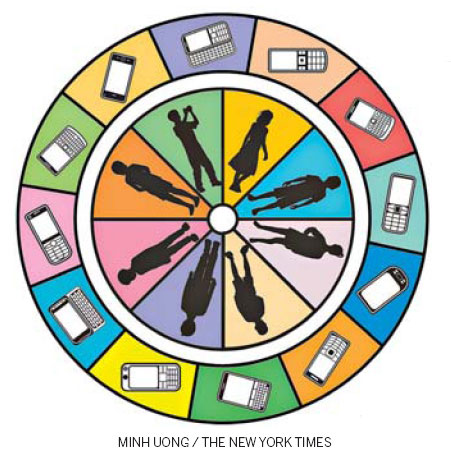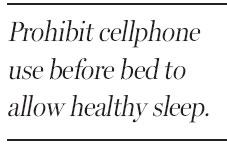A child's first phone: a guide for parents
Updated: 2012-09-16 08:03
(The New York Times)
|
|||||||||

Wendy Sue Swanson, a pediatrician in Seattle, knows that a 9-month-old baby can perform basic acts of imitation. You might expect smiling, blinking and some other facial expressions and gestures.
"I ask parents if their child pretends to talk on a cellphone," Dr. Swanson said. "Almost all of them do."
Now, 9 months may be a little young, but parents at some point have to consider whether to give their children mobile phones.
Dr. Swanson suggested that there was consensus developing that the 11- to 13-year-old age range is an acceptable time to take this step. A survey showed that the majority of American children who have a cellphone get one by the time they turn 13.
But what kind of phone should you get, and what can you do to help manage its use?
It seems fairly ridiculous to equip your 11- or 12-year-old with a full-fledged smartphone. Its myriad capabilities, combined with a child's terrible judgment, are a recipe for headaches.

There are specialized providers of cellphones for children like Kajeet, which promise easy family controls. But the major wireless carriers also offer phones and services that basically do the same thing. You may want to consider getting your child a prepaid phone through the major carriers or prepaid-only companies like Virgin Mobile and Metro PCS.
Given their low prices, many prepaid handsets have limited capabilities, and with a prepaid voice and data plan, there's a built-in limit to how much your child can use the phone. Who knows? Maybe they'll even learn the value of budgeting.
Every carrier has a different combination of parental control features and services, but generally speaking, they all are trying to do the same few things: restrict access to inappropriate apps and sites, limit usage and offer location-tracking services. Expect to pay about $5 extra a month to use these services.
If your child is using a smartphone, there are controls you can enable on the device as well. Parents of iPhone users should check out the Restrictions menu in Settings.
Android devices don't have built-in parental controls, but that's easy to fix. Free apps like Android Parental Controls and apps from online security companies like Norton add filtering and blocking tools so you can limit what your young mobile user encounters with his phone.
However, no amount of settings and preferences on your child's phone can replace parenting. "Don't retreat once you've set it up," Dr. Swanson advised.

One thing to consider is a curfew for any cell or smartphone use. Add to that a prohibition against any screen time - smartphone, computer or tablet - before bed. "We know that looking at a screen before bedtime inhibits a healthy sleep pattern," Dr. Swanson said. "And we also know that getting a good night's sleep is directly related to attention spans and classroom performance."
Keeping screens away from children also means keeping things like mobile phones out of their rooms at night. Keep the recharging cord in the kitchen, not your child's bedroom. "If you don't believe a child should have a TV in his or her room, and many parents agree with that, then there shouldn't be a cellphone in there either," Dr. Swanson said.
If you think about how addicted grown men and women can be when it comes to their phones, consider how much more powerful that urge can be with a child or a teenager. Neurological studies have shown that children's and teenagers' brains are not developed enough to always exercise self-restraint.
As with any electronic device, the goal here is to establish a sense of balance. "We want these rich experiences on earth for our children," Dr. Swanson said. "And part of that comes from the amazing technology we have access to, and part of that is because we also turn it off."
The New York Times
(China Daily 09/16/2012 page11)